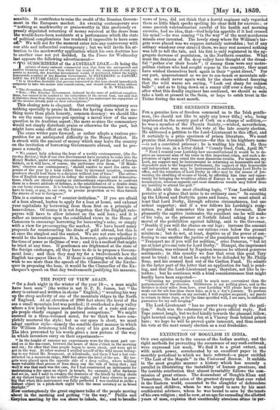THE GENEROUS PRISONER.
Fox a genuine love of freedom commend us to the Irish gentle- man, (we should not like to apply any lower title,) who, being imprisoned in the county gaol of Cork on a charge of sedition,— he was a member of the Phcenix Society,—wished, nevertheless, being an elector, to record his vote at the late county election. He addressed a petition to the Lord-Lieutenant to this effect, and it certainly is a prize specimen of prison literature. We must premise that Jeremiah O'Donovan—for this is his highborn name —is not a convicted prisoner ; he is waiting his trial. He thus argues his case, in a letter dated " County Gaol, Cork, April 30."
" Need I remind your Lordship how unconstitutional it would be to de- prive an innocent man of his voice in this important crisis, and such a de- privation of right may entail the most disastrous results. For instance, my Lord, my support may be instrumental in returning an honourable and in- dependent man to the Imperial Parliament, the support of this honourable and independent man may be instrumental in maintaining Lord Derby in office, and the retention of Lord Derby in office may be the means of pre- venting the shedding of oceans of blood, by affording him time and oppor- tunity for bringing the troublous affairs of Europe to a speedy and pacific termination, whereas opposite and most disastrous results may follow from my inability to attend the poll."
He adds with the most clinching logic, "Your Lordship will perceive at a glance that mine is no ordinary case." In counting up the Liberal and Derbyite gains and losses, we must admit at least that Lord Derby, through adverse circumstances, lost one ardent supporter ; and if a war follows his Lordship's resig- nation, we shall remember this new prophet Jeremiah. How pleasantly the captive insinuates the excellent use he will make of his vote, as the prisoner at Norfolk Island asking for a re- moval of the prohibition against talking, said to the Governor, " Double if you will the chains on our legs ; increase the amount of our daily work ; reduce our rations even below the present minimum ; but do not, at least, deprive us of the power of con- fessing to one another the justice of the punishment we undergo." "Transport me if you will for sedition," cries Donovan, "but let me at least give one vote for Lord Derby." Blanqui, the imprisoned Republican, was released by Napoleon because he uttered generous sentiments ; in this country we fear that even this good Tory must be tried ; but at least he ought to be defended by Mr. Philip Rose, and his counsel feed out of the Carlton Fund. He admits in the latter part of the letter that an application for bail is pend- ing, and that the Lord-Lieutenant may, therefore, not like to in- terfere ; but he continues with a kind considerateness that might hardly have been expected— "Granting me permission would be much more convenient than the postponement of the election. Skibbereen is my polling place, and as the distance is sixty miles from here, your Lordship will please have the pass made out for not less than three days, as it is a day's journey. To prevent any unnecessary trouble on my account, I will require no guard my parole to return in three days, or for the time specified will, I am sure, be sufficient guarantee for my safe keeping."
The Lord-Lieutenant " has no power to comply with the peti- tion." Such was the substance of the grave official reply. Red Tape cannot laugh, but we feel kindly towards the pleasant fellow, light hearted enough to poke fun at a Viceroy from behind prison bars ; we hope he will be proved quite innocent, and thus record his vote at the next county election as a real freeholder.


























 Previous page
Previous page